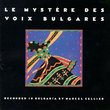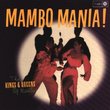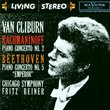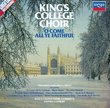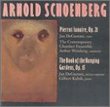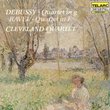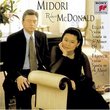Works of powerful understated spirituality
R. Hutchinson | a world ruled by fossil fuels and fossil minds | 11/07/2002
(5 out of 5 stars)
"This is a stunning pair of recordings, originally released by DG in 1989, and reissued as part of the label's 20/21 Echo series. Gidon Kremer, the violin virtuoso, is featured on both OFFERTORIUM, a violin concerto, and HOMMAGE a T.S. ELLIOT, where he is joined by soprano voice and other instruments in featured roles. OFFERTORIUM, composed in 1979-80, strikes me as similar in tone, though not derivative of, Schnittke's incredible CONCERTO GROSSO NO. 1, also featuring Kremer on violin.
These "late Soviet" works share a stark contrast between dark and light, and the protagonist's voice is set against powerful forces -- in OFFERTORIUM there are sinister horns, also reminiscent of Shostakovich. The piece is marked at about the half-way point, and then ends, with conventionally beautiful lyrical passages that come as welcome resolution of the tense preceding drama. Dutoit and the Boston Symphony are superb. Both pieces are characterized by complex textures, and internal development that is endlessly fascinating.
HOMMAGE a T.S. ELLIOT is a chamber work in 8 movements which alternates between strings, horns and vocals in various combinations. I've been listening to Boulez's new recording of PLI SELON PLI recently, as well as Schoenberg's PIERROT LUNAIRE and ERWARTUNG, and by comparison, Gubaidulina's writing for soprano voice is outstanding. Both of these works by Sofia Gubaidulina are clearly among the very best of the 20th century!"
Masterpieces of poise and insight, satisfying performances
Christopher Culver | 05/04/2004
(4 out of 5 stars)
"OFFERTORIUM is the first disc of Sofia Gubaidulina's work in Deutsche Grammaphon's "Echo 20/21" series of reissues. Gubaidulina, now recognised as one of the great living composers, is known for her deep spirituality and dedication to her own path away from trends, and this disc highlights this profundity and uniqueness well.
Gubaidulina's "Offertorium" is an exploration of the Royal Theme from Bach's "Musical Offering", using Klangfarbemelodie as Webern did in his orchestration. The theme is played nearly complete, is deconstructed note by note, hangs auspiciously absent, and then is mesmerizingly reconstructed as a Russian Orthodox hymn. The violin is at the core of this work, as it is a concerto dedicated to Gidon Kremer, but there are also very prominent contributions from the horns and drums. I find that this piece is an excellent introduction Gubaidulina's oeuve because it highlights the composer's tendency to meditative concentration broken by the rarest of powerful and shaking movements. However, while the work here is performed by its dedicatee, the sound quality is poor and the percussion oddly performed, so I would recommend the recording on BIS with Oleh Krysa over this.
The "Hommage a T.S. Eliot" is an exciting piece, here performed by a small ensemble selected by Gidon Kremer. Gubaidulina wrote the homage after reading the Eliot's "Four Quartets", often considered the poet's masterpiece and one of the finest works of spiritual poetry of the 20th century.
The homage consists of seven parts. The beginning two part are instrumental only. The first is with strings, a slow and tranquil exploration of sound very characteristic of Gubaidulina's "String Trio". The second is for horns, already much more energetic. In the third part the soprano appears solo, singing a portion from the first of Eliot's quartets, "Burnt Norton." The following movement, again for only strings, is brief and insubstantial, and gives the listener a rest from the intense philosophical insight of the previous. In the fifth part, the soprano returns to sing a portion from "East Coker", this time with the accompaniment of the entire ensemble. After this comes another instrumental movement for strings. The seventh portion begins with a deeply moving interplay between the strings that creates tension and suspense before the soprano marks a stunning climax of the work with the closing lines of "Little Gidding." This is a incredibly deep piece, and as a fan of T.S. Eliot I am quite satisfied with Gubaidulina's insightful and loyal treatment of "Four Quartets".
The instrumentalists give a very confident and unflagging performance. My only complaint about the recording is that soprano Christine Whittlesey's singing seems strained and pretentious, and doesn't respect the euphony of Eliot's work. In the recordings of Eliot reciting "Four Quartets", his delivery was always very simple, plain, and direct, a big contrast with Whittlesey's absurdly trilled r's.
I would certainly recommend this disc. It is among the easiest of the composer's work to find and the liner notes are excellent."


